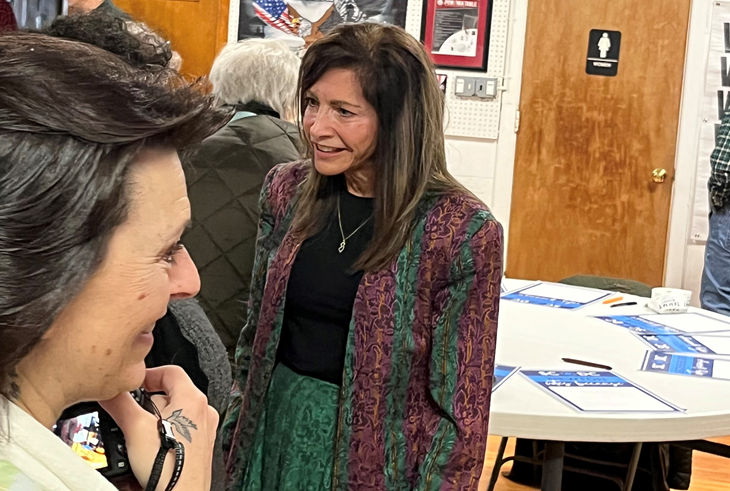Bergen Convention: No Kayo By Murphy, Standing Eight Count for Kim and The County Line Lives on

It may not have been the knockout blow she’d hoped for, but Democratic U.S. Senate candidate Tammy Murphy’s victory in the Bergen County Committee landed a punch on her chief opponent Congressman Andy Kim that forced him to take a standing eight count.
With 64 percent of the vote, her decisive endorsement conveyed resounding and unmistakable message ---the dominant influence of county political organizations in determining their favored candidate remains strong.
It could well serve as the model for the county organizations which have not yet formally voted their endorsement --- vote rich powerhouses like Essex, Hudson and Middlesex --- to follow suit and reassert their historical command of the primary election process through awarding the county line ballot placement.
Leaders in those counties announced their endorsement of the First Lady early on and if they succeed in delivering on those promises will swing the momentum solidly behind her campaign.
Kim jolted the Murphy campaign with his unexpected victory in the Monmouth County convention and has since picked up the endorsements in his home county of Burlington --- a foregone conclusion --- and in less populated Sussex , Warren and Hunterdon counties.
Murphy has won screening committee endorsements in Passaic and Union counties.
Bergen, with its 1,200 voting committee members, was the prize, however, and a victory there would provide an enormous boost to the winner.
If she runs the table in Essex, Hudson and Middlesex --- as well as Camden --- Kim’s task, though not impossible, is considerably more difficult.
He has demonstrated significant grassroots support but whether that translates into overcoming Murphy’s entrenched organizational backing is by no means assured.
The candidates, though, became quasi proxies, contestants in the struggle over control of the primary election process and the fate of the practice by both parties of grouping organization endorsed candidates in a column on the ballot while relegating other competitors to often difficult to locate positions.
Murphy has supported the county line practice while Kim ---although competing for it --- has called for its abolition and recently filed a suit in Federal court seeking its prohibition on constitutional grounds.
While the county line practice has emerged as an issue in the contest, a judicial ruling in time for accommodating it in the June primary is unlikely.
Election officials in several counties have written the court urging it to delay consideration of the suit, arguing it would create serious and potentially insurmountable logistical issues with filing deadlines and ballot printing and mailing processes.
Challenges to the county line have been mounted in the past, all without success.
The Legislature which could mandate ballot design has steered clear of it and the courts have been reluctant to dip its judicial toes in the turbulent political waters to resolve an internal partisan party dispute.
Advocates of the system contend it is a safeguard against interference or mischief by affording county organizations the flexibility to provide support to the strongest candidate and preclude frivolous and non-serious challenges.
County parties, they point out, can decide on their own to opt out of the system and move toward an open primary if they choose. As a practical matter, though, Voluntary surrender is wishful thinking.
Supporters also suggest a touch of hypocrisy or selective outrage on the part of the county line opponents, pointing out that many have benefitted from it in some way or another or have remained silent and lived comfortably with the system.
In 2017, for instance, nary a voice of protest was raised as Phil Murphy bought his way onto county lines, effectively ending the nascent gubernatorial campaigns of Jersey City Mayor Steve Fulop and Senate President Steve Sweeney.
Ironically, Fulop is a declared candidate for governor in 2025 and recently announced he would not pursue county line positions if his opponents did the same.
It is a practice, critics argue, that reeks of old style backroom bossism, placing candidates’ fate in the hands of a select few while effectively blocking participation by new and innovative individuals whose appeal could broaden and strengthen the party.
Make no mistake, though, Kim is a strong and viable candidate despite the loss of the Bergen County prize. The standing eight count he endured will give him time to catch his second wind, regain his breath and prepare to mix it up in the center of the ring.
While Murphy can be encouraged at the momentum turn with her victory in Bergen, she must avoid being lulled into complacency or listen to those who believe June 4 is in the bag.
The county line will live on--- at least for now --- and its ultimate fate will be decided another day.
Carl Golden is a senior contributing analyst with the Willam J. Hughes Center for Public Policy at Stockton University.





